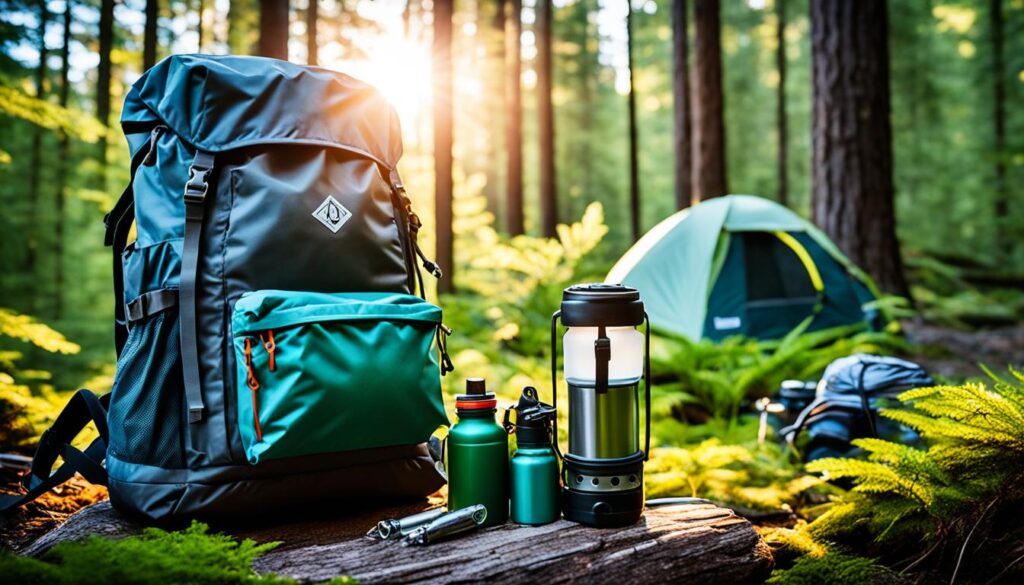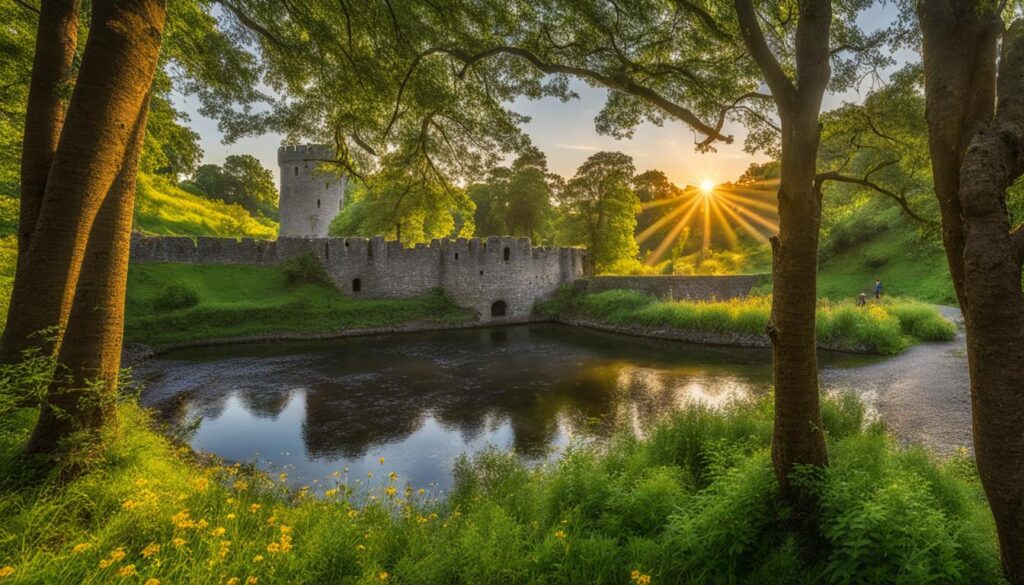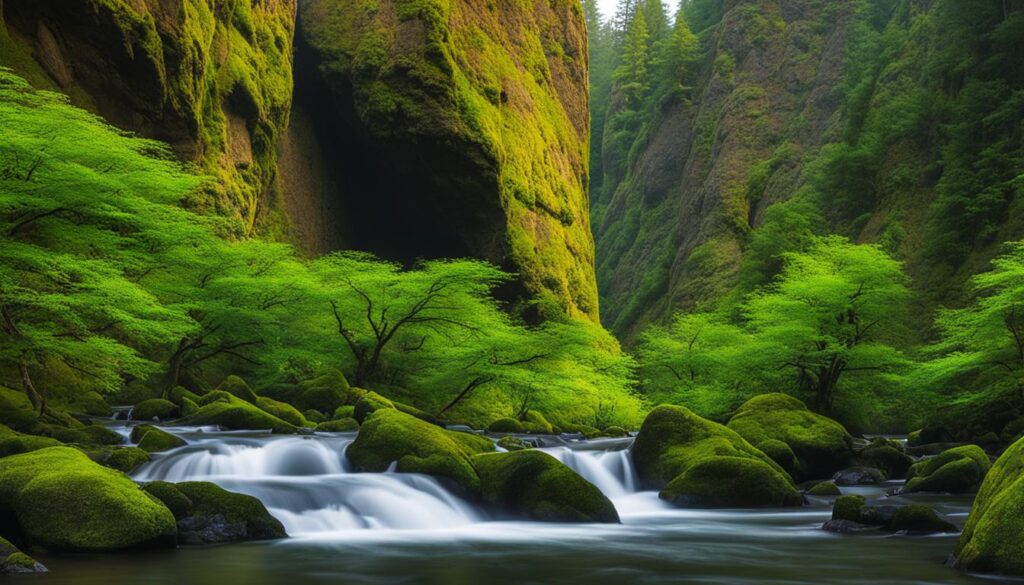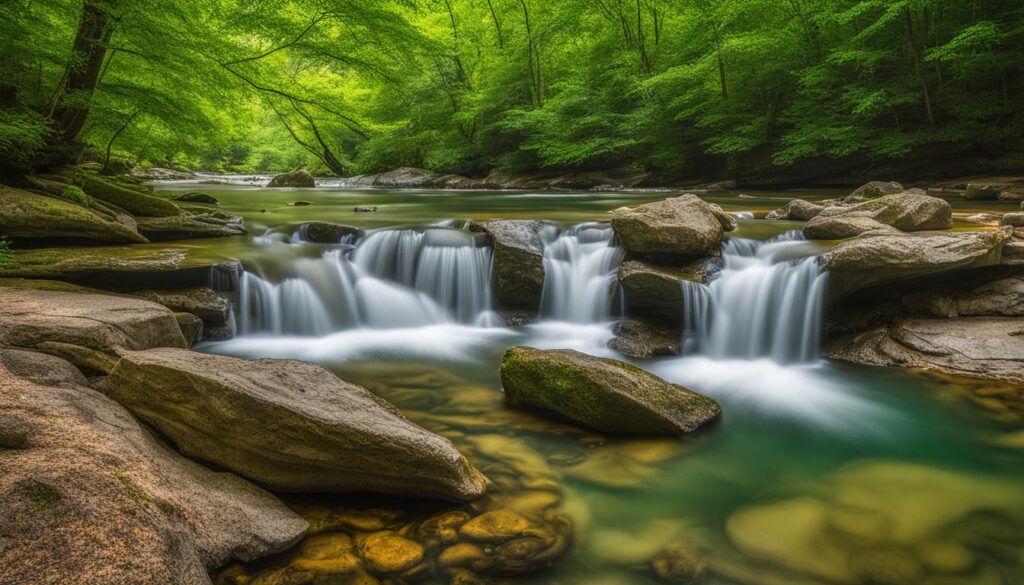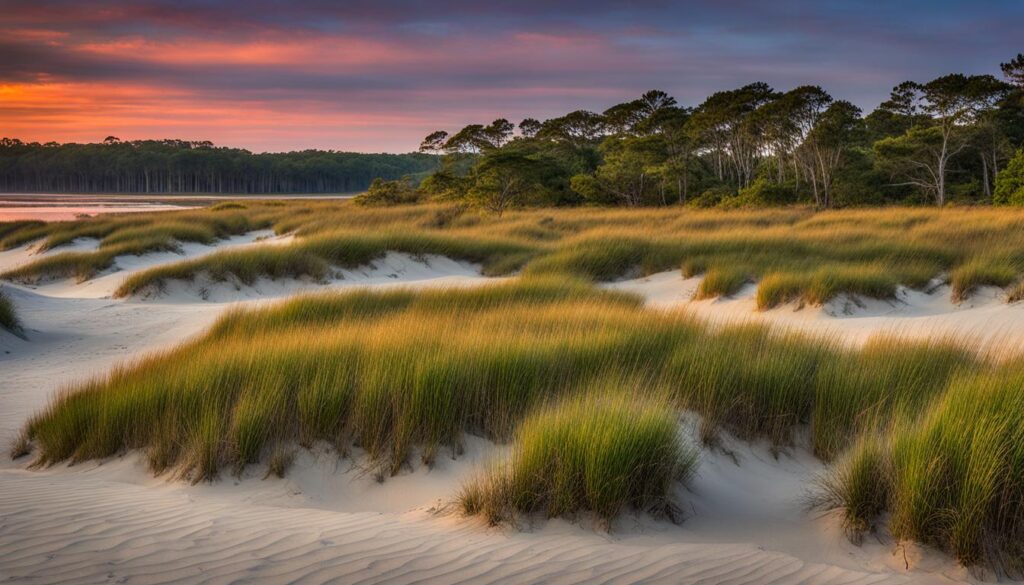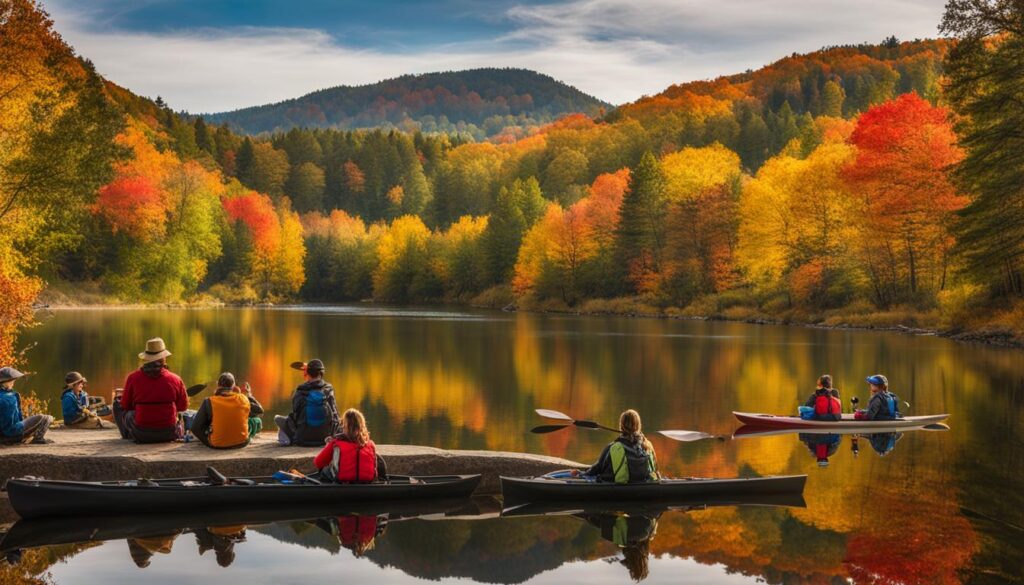Are you ready to immerse yourself in the wilderness, disconnected from modern conveniences and relying solely on your skills and the resources around you? If so, bushcraft camping might be just the adventure you’re seeking. In this guide, I will walk you through the world of bushcraft camping, from understanding the basics to mastering essential skills and choosing the right gear.
Bushcraft camping is all about utilizing traditional, primitive skills to survive and thrive in nature. It goes beyond simple outdoor camping and requires a deeper level of knowledge and preparation. By honing your bushcraft camping skills, you’ll develop a greater appreciation for nature and gain invaluable survival knowledge.
Before you embark on your bushcraft camping journey, it’s essential to understand what it entails and how to prepare yourself adequately. From tips and techniques to essential gear and skills, this guide will provide you with all the information you need.
Key Takeaways:
- Learn the basics of bushcraft camping and how it differs from regular camping.
- Understand the importance of having the right gear for bushcraft camping.
- Discover the essential skills and techniques needed to thrive in the wilderness.
- Get valuable tips for beginner bushcraft campers.
- Explore some of the best bushcraft camping sites worldwide.
Bushcraft camping is a type of wilderness camping that emphasizes self-sufficiency and the use of traditional skills and knowledge. It involves using natural materials found in the environment to build shelters, create fire, purify water, and find food. Bushcraft camping is about immersing oneself in nature and relying on basic survival skills to thrive. It requires a deep understanding of the natural world and the ability to adapt to different environments. To engage in bushcraft camping, you need to master various techniques and have the right equipment to ensure your safety and comfort in the wilderness.
When it comes to bushcraft camping, it’s essential to have a comprehensive understanding of the camping techniques involved and the equipment required. By honing your skills and investing in the right gear, you can fully immerse yourself in the wilderness and enjoy a rewarding camping experience.
Bushcraft Camping Techniques
Bushcraft camping techniques are the foundation of a successful wilderness camping experience. These techniques enable you to utilize the resources available in nature to meet your basic survival needs. Here are some key bushcraft camping techniques:
- Shelter Building: Learn how to construct various types of shelters using natural materials like branches, leaves, and rocks.
- Firecraft: Master fire-building techniques using friction-based methods like bow drill or hand drill, as well as other techniques such as flint and steel.
- Water Purification: Understand different water purification methods like boiling, filtering, or using natural purification techniques.
- Foraging: Develop knowledge and skills to identify edible plants, berries, nuts, and mushrooms in the wild.
- Navigation: Learn how to navigate using natural landmarks, celestial bodies like the sun or stars, and basic orienteering skills.
Bushcraft Camping Equipment
Equipping yourself with the right gear is essential for bushcraft camping. While the goal is to use natural resources, certain tools and equipment can enhance safety, efficiency, and comfort in the wilderness. Here are some essential bushcraft camping equipment:
- Knife: A high-quality, reliable knife is a versatile tool for various tasks like carving, cutting wood, preparing food, and building shelters.
- Axe or Hatchet: These tools are invaluable for chopping wood, splitting logs, and creating tinder for fire.
- Cordage: Strong, durable cordage like paracord or natural fibers is useful for lashing, building structures, securing gear, and creating traps.
- Firestarter: Carry reliable firestarting tools like waterproof matches, a ferro rod, or a fire piston for efficiently starting fires.
- Water Bottle or Canteen: Stay hydrated by carrying a durable water container to collect and store water from natural sources.
- Navigation Tools: Equip yourself with a compass, map, and GPS device to aid in navigation and prevent getting lost.
- First Aid Kit: Ensure you have a well-stocked first aid kit for treating minor injuries and managing emergencies in the wilderness.
With a solid understanding of bushcraft camping techniques and the right equipment, you’ll be well-prepared to embark on your wilderness adventure. Remember, bushcraft camping is not only about survival but also about appreciating the beauty of nature and connecting with your primal instincts. Stay vigilant, respect the environment, and continue honing your skills to make the most of your bushcraft camping experience.
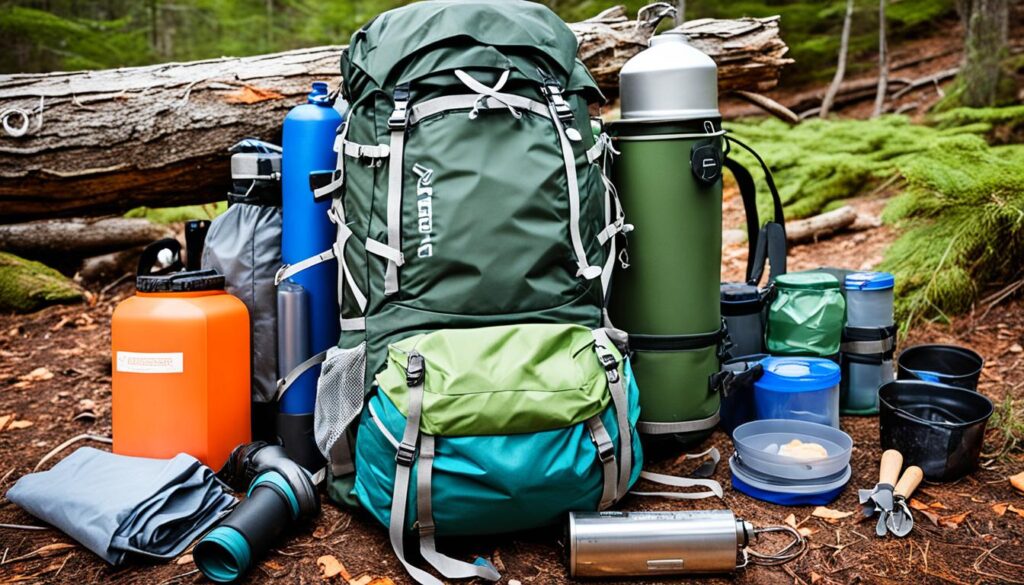
Essential Bushcraft Camping Gear
When it comes to bushcraft camping, having the right gear is crucial. Here are some essential items that should be included in your bushcraft camping kit:
1. Bushcraft Knife
A reliable bushcraft knife is the backbone of any bushcraft camping adventure. Look for a high-quality, fixed blade knife with a sturdy handle and a sharp, durable blade. A bushcraft knife can be used for various tasks such as cutting wood, preparing food, and building shelters.
2. Firestarter
A firestarter is an essential tool for starting fires in bushcraft camping. Opt for a reliable firestarter such as a Ferro rod or a waterproof lighter. These tools will help you quickly and easily ignite fires even in challenging weather conditions.
3. Shelter System
Having a reliable shelter system is essential for protecting yourself from the elements during bushcraft camping. Consider a lightweight tent, hammock, or tarp that is easy to set up and provides adequate protection from rain, wind, and bugs.
4. Water Filtration System
Access to clean drinking water is crucial when camping in the wilderness. Invest in a portable water filtration system that can remove bacteria and other contaminants from natural water sources. This will ensure that you have a safe and reliable water supply throughout your bushcraft camping trip.
5. Outdoor Cookware
Having the right cookware is important for preparing meals in the bush. Look for lightweight, durable pots, pans, and utensils that are suitable for outdoor cooking. Consider options that are compact and easy to pack.
6. First Aid Kit
A comprehensive first aid kit is an essential item for any outdoor adventure. Make sure your kit includes bandages, antiseptic wipes, pain relievers, and any necessary prescription medications. It’s important to be prepared for any minor injuries or illnesses that may occur during your bushcraft camping trip.
7. Navigation Tools
When exploring the wilderness, having the right navigation tools is crucial. Invest in a reliable compass, topographic maps, and a GPS device to help you navigate and stay on track. These tools will ensure that you can confidently explore your surroundings and find your way back to camp.
Remember, when it comes to bushcraft camping gear, prioritize quality, durability, and functionality. Choose items that are specifically designed for outdoor use and can withstand the rigors of the wilderness.
| Essential Bushcraft Camping Gear | Description |
|---|---|
| Bushcraft Knife | A high-quality fixed blade knife for various tasks |
| Firestarter | A reliable tool for starting fires in any weather condition |
| Shelter System | A lightweight tent, hammock, or tarp for protection |
| Water Filtration System | A portable system for accessing clean drinking water |
| Outdoor Cookware | Lightweight and durable pots, pans, and utensils for cooking |
| First Aid Kit | A comprehensive kit for minor injuries and illnesses |
| Navigation Tools | Compass, topographic maps, and GPS for navigation |
Having these essential bushcraft camping gear items will ensure that you are well-prepared for your adventure in the wilderness.
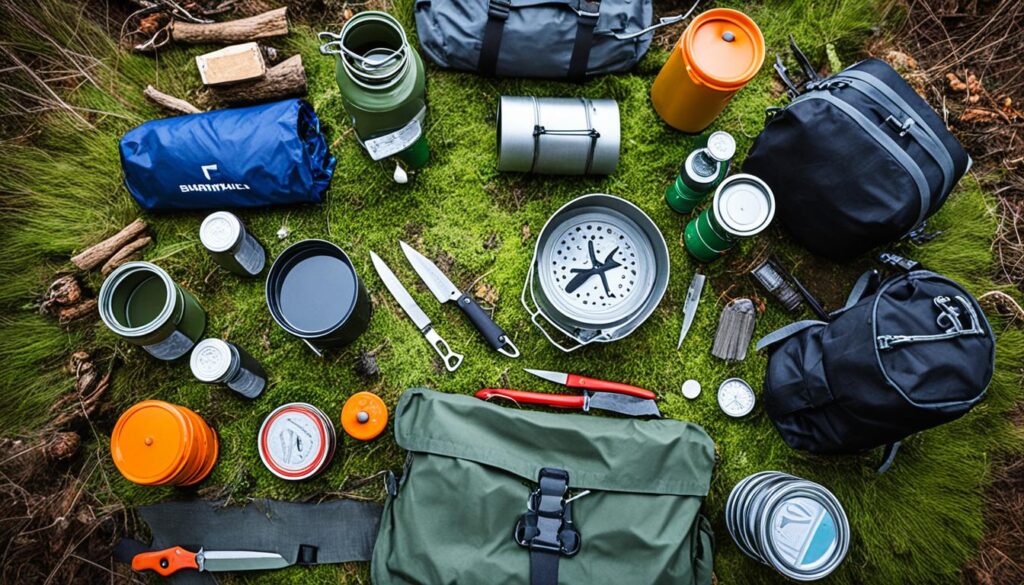
Bushcraft Camping Skills and Techniques
To truly excel in bushcraft camping, it’s essential to acquire a range of skills and techniques that will enable you to navigate the wilderness with confidence. Here are some key skills that every bushcraft camper should strive to master:
1. Firecraft
Learning how to start a fire without matches or a lighter is a fundamental bushcraft skill. Practice different fire-starting methods such as using a fire bow, flint and steel, or a magnifying glass to harness the power of the sun. Remember to prioritize safety and practice fire building in a controlled environment.
2. Shelter Building
In the wild, having a reliable shelter is vital for protection from the elements. Explore various shelter-building techniques such as constructing a debris shelter, lean-to, or tarp tent. Familiarize yourself with different knots and learn how to tie them securely.
3. Navigation
Being able to navigate through unfamiliar terrain is crucial for bushcraft campers. Learn how to use a map and compass effectively, as well as how to read natural signs such as moss growth, sun position, and the direction of water flow. Practice using landmarks to orient yourself and develop a sense of direction.
4. Foraging
One of the most rewarding aspects of bushcraft camping is foraging for food in the wild. Study edible plants, mushrooms, and berries in your area and learn how to identify them safely. Remember to respect the environment and practice sustainable foraging techniques.
5. Water Sourcing and Purification
Knowing how to find and purify water in the wilderness is essential for survival. Learn how to locate water sources such as rivers, streams, and natural springs. Master different water purification methods, such as boiling, filtering, or using purification tablets, to ensure you have access to safe drinking water.
6. Campsite Selection
Choosing the right campsite plays a significant role in the comfort and safety of your bushcraft camping experience. Look for flat, elevated ground away from hazards such as dead trees or animal trails. Consider factors such as proximity to water sources, availability of firewood, and natural shelter options.
7. Knife Skills
A sturdy and reliable knife is an essential tool in bushcraft camping. Invest time in learning basic knife skills such as carving, woodworking, and preparing food. Practice knife safety and maintenance to ensure your blade remains sharp and in optimal condition.
“In the wilderness, your skills are your survival. Mastering bushcraft techniques will not only enhance your camping experience but also give you the confidence to thrive in any outdoor setting.” – Bear Grylls
By honing these bushcraft camping skills and techniques, you’ll be well-prepared to tackle the challenges of the wilderness and fully immerse yourself in the beauty of nature during your camping adventures.
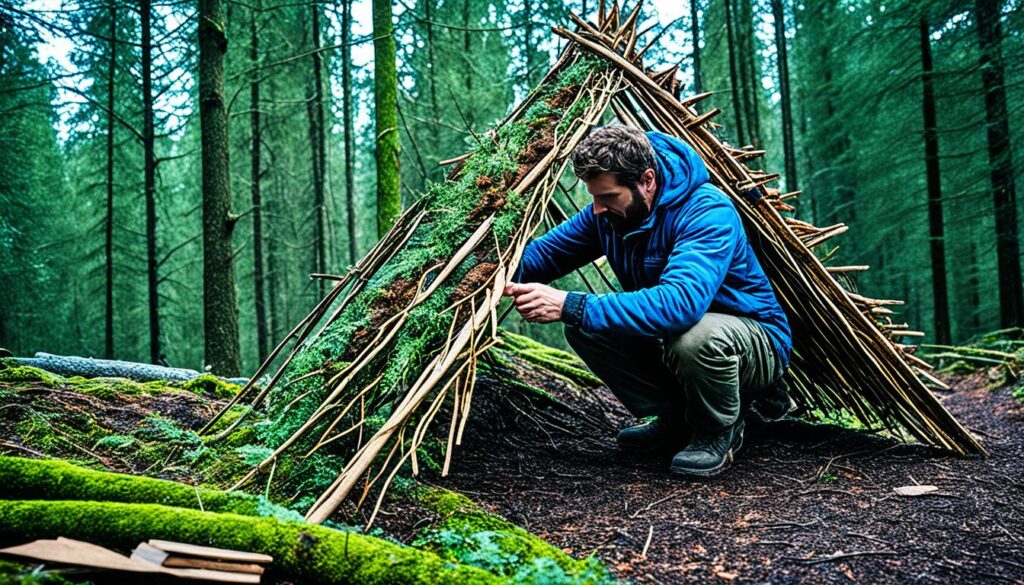
| Skill | Description |
|---|---|
| Firecraft | Learn various fire-starting methods and practice fire building techniques. |
| Shelter Building | Explore different techniques for constructing shelters and familiarize yourself with knots. |
| Navigation | Master map and compass reading skills, as well as natural navigation techniques. |
| Foraging | Study edible plants and learn how to identify and gather food from the wild. |
| Water Sourcing and Purification | Know how to find and purify water sources to ensure access to safe drinking water. |
| Campsite Selection | Choose suitable campsites based on factors such as terrain, proximity to resources, and safety. |
| Knife Skills | Master basic knife skills for various tasks such as carving and preparing food. |
Tips for Beginner Bushcraft Campers
If you are new to bushcraft camping, I’ve got some essential tips to help you get started on your wilderness adventure. These tips will not only ensure your safety but also enhance your overall experience in nature. So, let’s dive in!
Start with the Basics
Before embarking on your first bushcraft camping trip, familiarize yourself with the essential skills and gear needed. Learn basic firecraft, shelter building, navigation, and foraging techniques. Invest in a reliable bushcraft knife, a sturdy backpack, and other necessary camping gear.
Practice Makes Perfect
Don’t wait until you’re in the wilderness to try out your bushcraft skills. Practice in your backyard or local park to refine your techniques. Start by building small shelters, starting fires, and identifying edible plants. The more you practice, the more confident and prepared you’ll feel.
Research Your Campsite
Before heading out, research your chosen campsite thoroughly. Look for information on local regulations, wildlife, terrain, and weather conditions. This knowledge will help you plan accordingly and ensure your safety throughout your camping trip.
Carry a First Aid Kit
Accidents can happen even in the most experienced camper’s journey. Always carry a well-stocked first aid kit to handle minor injuries and emergencies. Ensure the kit contains bandages, antiseptic wipes, pain relievers, and any necessary prescription medications.
Stay Hydrated and Nourished
Proper hydration and nutrition are vital during your bushcraft camping adventure. Carry an ample supply of clean drinking water and pack nutrient-rich, lightweight foods that require minimal cooking. Also, learn to identify safe water sources and edible plants in the wild.
Please note: Bushcraft camping requires a deep respect for nature and responsible wilderness practices. Follow Leave No Trace principles and always leave your campsite as you found it.
By following these tips, you’ll be well on your way to becoming a confident bushcraft camper. Remember, the journey is as important as the destination, so embrace the challenges and enjoy the beauty of the great outdoors.
Best Bushcraft Camping Sites
When it comes to finding the best bushcraft camping sites, there are endless possibilities around the world. Whether you prefer dense forests, majestic mountains, or remote coastal areas, there are plenty of destinations that offer the perfect backdrop for your bushcraft adventure. Here are some of the top locations to consider:
1. Canadian Rockies, Canada
Known for its stunning landscapes and abundant wildlife, the Canadian Rockies provide an ideal setting for bushcraft camping. From Banff National Park to Jasper National Park, there are countless trails and camping spots to explore.
2. Cairngorms National Park, Scotland
With its vast forests, rugged mountains, and picturesque lochs, Cairngorms National Park in Scotland is a haven for bushcraft enthusiasts. You can immerse yourself in the beauty of the Scottish Highlands while honing your wilderness skills.
3. Adirondack Mountains, United States
Located in upstate New York, the Adirondack Mountains offer a diverse and breathtaking landscape for bushcraft camping. With over six million acres of wilderness to discover, there are endless opportunities to test your survival skills.
4. Great Otway National Park, Australia
If you’re looking for bushcraft camping sites in Australia, the Great Otway National Park in Victoria is a fantastic choice. From dense rainforests to rugged coastlines, this park showcases the country’s stunning natural beauty.
5. Swedish Lapland, Sweden
For a truly immersive bushcraft experience, head to Swedish Lapland. This region offers vast expanses of untouched wilderness, where you can learn traditional survival techniques from the indigenous Sami people.
6. Dartmoor National Park, England
With its wild moorlands, ancient woodlands, and medieval ruins, Dartmoor National Park in England provides an atmospheric setting for bushcraft camping. Explore its diverse landscapes and delve into the rich history of the area.
These are just a few examples of the best bushcraft camping sites around the world. Each destination offers unique challenges and rewards, allowing you to connect with nature and develop essential survival skills. Remember to respect the environment, follow local regulations, and leave no trace behind. Happy bushcraft camping!
Conclusion
Bushcraft camping is a truly rewarding and fulfilling activity that allows you to reconnect with nature and develop essential survival skills. By equipping yourself with the right gear and mastering key techniques, you can ensure a safe and enjoyable bushcraft camping experience.
Remember to always prioritize safety, both for yourself and the environment. Properly dispose of waste, leave no trace, and respect the natural ecosystem around you. Additionally, continue learning and refining your skills as you embark on your bushcraft camping adventures. There is always something new to discover, whether it’s mastering firecraft or improving your navigation skills.
So, if you’re ready to dive into the world of bushcraft camping, start by assembling the necessary gear, learning the essential skills, and planning your first trip to a suitable camping site. With practice, patience, and a thirst for knowledge, you’ll become confident in your bushcraft abilities and create unforgettable memories in the great outdoors. Happy camping!
FAQ
What is bushcraft camping?
Bushcraft camping is a form of wilderness camping that focuses on using traditional, primitive skills to survive and thrive in nature. It involves utilizing techniques such as firecraft, shelter building, foraging, and navigation.
What are some bushcraft camping tips?
Here are some helpful tips for bushcraft camping:- Always carry a reliable fire starter.- Learn how to identify edible plants and forage for food.- Practice shelter building techniques before heading out.- Carry a navigation tool or learn how to navigate using natural landmarks.- Pack light, but always bring a first aid kit and emergency supplies.
What gear do I need for bushcraft camping?
Some essential gear for bushcraft camping includes a knife, tarp or tent for shelter, water purification system, cooking equipment, fire starter, navigation tools, first aid kit, and proper clothing and footwear.
What skills are important for bushcraft camping?
Important skills for bushcraft camping include firecraft, shelter building, foraging, navigation, water purification, and knot tying.
Do you have any tips for beginner bushcraft campers?
Yes, here are some tips for beginners:- Start with short trips close to home to practice your skills.- Take a bushcraft camping course or join a group to learn from experienced campers.- Be open to learning from your mistakes and continuously improving your skills.- Always prioritize safety and respect for the environment.
What are some of the best bushcraft camping sites?
Some top destinations for bushcraft camping include:- Adirondack State Park in New York, USA- The Canadian Rockies in Canada- The Scandinavian wilderness in Norway and Sweden- The Scottish Highlands in the UK- The Australian outback
